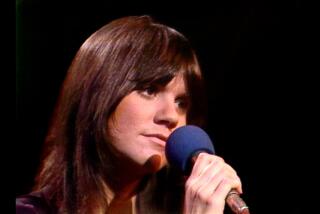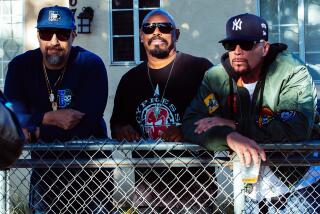‘Nightline’s’ Historic Jerusalem Telecasts Buried in Late Night
- Share via
Something is wrong when the best television--the bravest, most important, most needed television--is the television least available to most of the public.
Think of it this way: What if you wanted to buy a valued author’s new book, but the bookstore opened only for an hour, at 11:30 p.m.? Or what if “The Last Emperor” had been available at movie theaters only after most of us went to bed?
So it was with last week’s “Nightline” on ABC, last week’s bold, historic, extraordinary--and under-watched--”Nightline.”
That was the week that “Nightline” and its incomparable Ted Koppel spent in Jerusalem for five live and expanded telecasts on the conflict between Israelis and Palestinians over the occupied West Bank and Gaza Strip.
The programs were epic as a bloc, opening a porthole of modest dialogue between bitter old foes and offering the best TV opportunity yet for understanding the roots and global implications of the struggle.
For too many Americans, however--those without VCRs or bedtimes that accommodate late-night or all-night TV--it was the week that wasn’t.
Yet, hats off to ABC for perpetuating “Nightline” at any hour and allowing it to travel to such hot spots as South Africa, the Philippines and Israel and to expand like an accordion (the Jerusalem programs were doubled in length to about 60 minutes, except for Tuesday’s even longer, marathon segment).
Still, that absurd time slot--10:30 p.m. in the Central and Mountain Time Zones, 11:30 p.m. Eastern and Pacific, or even later when a local station airs it on a delay--seems indefensible when “Nightline” is indispensable.
As it was last week.
The better the “Nightline,” the lower your tolerance for its obscure time slot and the relatively few thudding, narrow-thinking stations around the country that either delay or don’t air the series.
What did non-viewers miss?
Not TV diplomacy. As expected, last week’s “Nightline” made only sense, not peace, presenting a sharp microcosm of this enduring and volatile Middle East tangle that has enraptured media since the start of Palestinian uprisings in the West Bank and Gaza Strip some five months ago. The series gave a voice to both sides while showing a complex Israel as much at war with itself as with the Palestinians.
The soul of the “Nightline” week was Tuesday’s logistics nightmare, a town hall-style meeting from Jerusalem, perilously gathering Israelis and Palestinians under one roof for a panel discussion as unyielding as it was impassioned.
As any regular “Nightline” watcher would have predicted, Koppel the moderator was A-plus under extreme pressure.
More importantly, the program was three hours and 10 minutes of tense, uneasy coexisting, of throwing and dodging verbal stones, of pleading and demanding, of eloquence and rigidity, of the three Palestinian panelists refusing even to look at their four Israeli counterparts. When it was over, the two sides could not agree even to disagree.
It was utterly depressing--and, as a display of honest, deep, raw feelings, it was utterly exhilarating. It was simply remarkable TV that screamed out for prime-time exposure, but instead concluded at 2:40 a.m. Los Angeles time.
Show this TV masterpiece to America in the middle of the night? That’s like wasting Michelangelo on the ceiling of the men’s room at Burger Chef.
“Nightline” was scrupulously balanced throughout the week, airing taped packages that put the conflict in historical context--the nature of the context depending on which side was asked.
Koppel interviewed Israel Defense Minister Yitzhak Rabin and a spokesman for the Palestine Liberation Organization. He interviewed Maj. Gen. Abram Mitzna, the commander responsible for keeping order in the occupied territories.
One program ended on a lyrical note, with readings of Palestinian and Israeli poetry. And on Friday’s finale, Koppel interviewed Israeli Foreign Minister Shimon Peres and Prime Minister Yitzhak Shamir.
But it was Friday’s conclusion--a series of revealing statements from Israeli and Palestinian youngsters--that left the deepest impression, applying bleak punctuation marks to a struggle whose resolution remains unsighted.
Most not only saw no light at the end of the tunnel, they saw no tunnel.
Locked into their feelings from an early age, children on both sides expressed anger, suspicion and fear. “I dreamed that they’re trying to kill me,” an Israeli child said of the Palestinians. “They’re killing us--we gotta kill them,” a Palestinian child said of the Israelis.
“It’s our land, it’s for us,” another Palestinian youngster said. “Could they (Israelis) live in Tel Aviv?” an ABC field producer asked that child. “No,” was the reply. “What about Haifa?’ “Out!” was the reply. “What about Jerusalem?” “Out!” was the reply.
It was grim.
Not all went well for Koppel and his series. Rabin and the PLO spokesman were pretty much a wash, both men mostly skirting Koppel’s pointed questions.
And the Koppel who was so admirably blunt with Shamir (“Isn’t it arrogant for an Israeli prime minister to tell Palestinians they don’t understand the needs of their people?”), never asked Mitzna a question begging to be asked.
Why did the army destroy 14 houses in a Palestinian village before completing its investigation into the recent death of a Jewish settler girl there, an investigation that would conclude that she was killed by a bullet from another settler’s gun?
The few flaws were barely discernible in a week of shows that excelled even with the political mine-fields that “Nightline” had to navigate.
Despite the late hour, viewer interest was reported heavier than usual for “Nightline,” making you wonder how large the audience would have been had the programs been more accessible.
I watched them in Kansas City, Mo., on KMBC-TV, which airs “Nightline” each evening at midnight--90 minutes after its network time in the Central Time Zone.
With bigger profits in mind, KMBC substitutes “MASH” reruns for “Nightline” at 10:30 p.m., then adds “Magnum, P.I.” reruns, before finally getting to Koppel.
Some stations, it seems, suffer a public service gap as wide as the gap separating Israelis and Palestinians.
More to Read
The complete guide to home viewing
Get Screen Gab for everything about the TV shows and streaming movies everyone’s talking about.
You may occasionally receive promotional content from the Los Angeles Times.






